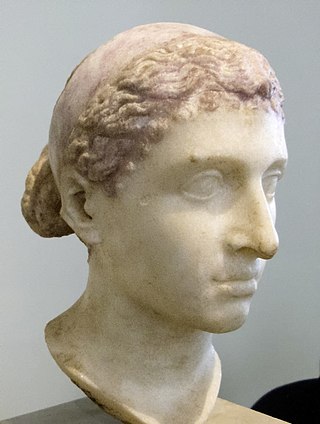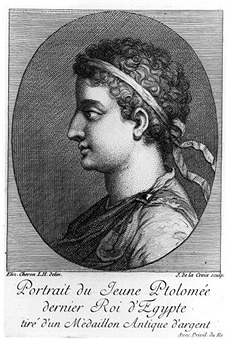This article needs additional citations for verification .(December 2009) |
Ganymedes (died early 47 BC) was a eunuch in the court of Cleopatra VII who proved an able adversary of Julius Caesar.
This article needs additional citations for verification .(December 2009) |
Ganymedes (died early 47 BC) was a eunuch in the court of Cleopatra VII who proved an able adversary of Julius Caesar.
Ganymedes was the tutor of Cleopatra's half-sister and rival, Arsinoe. When civil war broke out between Ptolemy XIII and Cleopatra, Arsinoë sided with Ptolemy, escaping the palace in Ganymedes's company to take command of the army. She executed Achillas, who was the general of the army and Pothinus's co-conspirator in the murder of Pompey, and appointed Ganymedes in his stead. [1]
While Achillas besieged Alexandria, Ganymedes' army was in possession of the sources of the river, which gave him control of the canals that provided Alexandria with water, and, by extension, Caesar's water supply. With this in mind, he separated his portion of the river from Caesar's, and engineered machines to fill up Caesar's canals and cisterns with salt water. Several days of increasingly brackish water panicked Caesar's legionaries to the point where Caesar had to deal with the situation personally. Aware that Alexandria was built on limestone, and that limestone was porous, Caesar ordered wells built, restoring the water supply and calming his soldiers. [2]
Two days after Caesar frustrated Ganymedes' ploy, the Thirty-Seventh Legion, traveling by sea and also desperately short of water, arrived in Egypt but was unable to land at Alexandria due to contrary winds. Caesar went out with his fleet to personally attend to the matter but several of his sailors, sent ashore to find water, were captured by Ganymedes' cavalry, who then informed their general of Caesar's location.
Marshalling every ship at his disposal, Ganymedes then engaged Caesar in a naval battle, but Caesar prevailed, [3] whereupon the disheartened Alexandrians almost gave up the fight. However, Ganymedes succeeded in rallying them once again, and prepared a larger fleet for another engagement, which this time he was sure he could win. This battle, however, against Caesar's admiral Euphranor, resulted in an even more devastating defeat for Ganymedes. [4]
Switching tactics, Ganymedes then focused on bombarding Caesar's forces. This failed to impress Caesar's veterans, although it did result in a stalemate. Afterward, a delegation of Alexandrians petitioned Caesar to return Ptolemy XIII to them, in exchange for Arsinoë, as they had grown weary of Arsinoë and Ganymedes and wished for their King to lead them. Soon, however, Caesar received reinforcements and won the decisive battle.
Ganymedes subsequently perished in the fight. [5]

This article concerns the period 49 BC – 40 BC.

Cleopatra VII Thea Philopator was Queen of the Ptolemaic Kingdom of Egypt from 51 to 30 BC, and its last active ruler. A member of the Ptolemaic dynasty, she was a descendant of its founder Ptolemy I Soter, a Macedonian Greek general and companion of Alexander the Great. After the death of Cleopatra, Egypt became a province of the Roman Empire, marking the end of the last Hellenistic-period state in the Mediterranean and of the age that had lasted since the reign of Alexander. Her first language was Koine Greek, and she was the only known Ptolemaic ruler to learn the Egyptian language.

Ptolemy XIII Theos Philopator was Pharaoh of Egypt from 51 to 47 BC, and one of the last members of the Ptolemaic dynasty. He was the son of Ptolemy XII and the brother of and co-ruler with Cleopatra VII. Cleopatra's exit from Egypt caused a civil war to break out between the pharaohs. Ptolemy later ruled jointly with his other sister, Arsinoe IV.

Ptolemy XII Neos Dionysus was a king of the Ptolemaic Kingdom of Egypt who ruled from 80 to 58 BC and then again from 55 BC until his death in 51 BC. He was commonly known as Auletes, referring to his love of playing the flute in Dionysian festivals. A member of the Ptolemaic dynasty, he was a descendant of its founder Ptolemy I, a Macedonian Greek general and companion of Alexander the Great.
Berenice IV Epiphaneia was a Greek princess and Queen of the Ptolemaic dynasty. From 58 to 55 BC, Berenice IV ruled Egypt during the political exile of her father Ptolemy XII Auletes to Rome. It is unclear if she was co-ruler of Egypt with her mother Cleopatra V or a possible sibling Cleopatra VI from 58 to 57 BC, but became sole ruler in 57 BC. On the return of Ptolemy XII to Egypt with Roman military aid and an army led by Aulus Gabinius, Berenice IV was overthrown and executed by her rival father, who later bequeathed his throne to his daughter Cleopatra VII and son Ptolemy XIII as co-rulers.

Arsinoë IV was the fourth of six children and the youngest daughter of Ptolemy XII Auletes. Queen and co-ruler of Ptolemaic Egypt with her brother Ptolemy XIII from 48 BC – 47 BC, she was one of the last members of the Ptolemaic dynasty of ancient Egypt. Arsinoë IV was also the half sister of Cleopatra VII. For her role in conducting the siege of Alexandria against her sister Cleopatra, Arsinoë was taken as a prisoner of war to Rome by the Roman triumvir Julius Caesar following the defeat of Ptolemy XIII in the Battle of the Nile. Arsinoë was then exiled to the Temple of Artemis at Ephesus in Roman Anatolia, but she was executed there by orders of triumvir Mark Antony in 41 BC at the behest of his lover Cleopatra VII.
Pothinus or Potheinos, a eunuch, was regent for Pharaoh Ptolemy XIII Theos Philopator of the Ptolemaic Kingdom. He is most remembered for turning Ptolemy against his sister and co-ruler Cleopatra, thus starting a civil war, and for having Pompey decapitated and presenting the severed head to Julius Caesar according to some sources.

The Cleopatras is a 1983 BBC Television eight-part historical drama serial. Written by Philip Mackie, it is set in Ancient Egypt during the latter part of the Ptolemaic Dynasty with an emphasis on the Cleopatras. Intended to be the I, Claudius of the 1980s, The Cleopatras met with a decidedly mixed critical reaction. It was regarded and portrayed as a gaudy farce.

The Battle of the Nile in early 47 BC saw the combined Roman–Egyptian armies of Julius Caesar and Cleopatra VII defeat those of the rival Queen Arsinoe IV and King Ptolemy XIII and secure the throne of Egypt.

Cleopatra is a 1999 miniseries adaptation of Margaret George's 1997 historical fiction novel The Memoirs of Cleopatra. Produced by Hallmark Entertainment, it stars Leonor Varela as the Egyptian queen Cleopatra, Timothy Dalton as Julius Caesar, Billy Zane as Mark Antony, Rupert Graves as Octavius, Sean Pertwee as Brutus and Bruce Payne as Cassius. Cleopatra was shown first on the ABC television network in two parts on two consecutive evenings in May 1999 and then released on videotape and DVD. Judy Farr, Martin Hitchcock and Frank Walsh were nominated for an Emmy in 1999 for outstanding art direction for a miniseries or a movie for their work on Cleopatra.
The Alexandrian war, also called the Alexandrine war, was a phase of Caesar's civil war in which Julius Caesar involved himself in an Egyptian dynastic struggle. Caesar attempted to mediate a succession dispute between Cleopatra and Ptolemy XIII and exact repayment of certain Egyptian debts.

Achillas was one of the guardians of the Egyptian king Ptolemy XIII Theos Philopator, and commander of the king's troops, when Pompey fled to Egypt in September 48 BC. He was called by Julius Caesar a man of extraordinary daring, and it was he and Lucius Septimius who killed Pompey at the suggestion of the eunuch Pothinus and Theodotus of Chios.

Lucius Septimius was a Roman soldier and mercenary who is principally remembered as one of the assassins of the triumvir Pompey the Great. At the time of the assassination in 48 BC, Septimius was serving the Ptolemies of Egypt as a mercenary. He was dispatched with orders to murder Pompey by Ptolemy XIII's advisors who wanted to win the favour of Julius Caesar for their king.
Theodotus of Chios was the rhetoric tutor of the young Egyptian king Ptolemy XIII.

The siege of Alexandria was a series of skirmishes and battles occurring between the forces of Julius Caesar, Cleopatra VII, Arsinoe IV, and Ptolemy XIII, between 48 and 47 BC. During this time Caesar was engaged in a civil war against remaining Republican forces.
The Gabiniani were 2000 Roman legionaries and 500 cavalrymen stationed in Egypt by the Roman general Aulus Gabinius after he had reinstated the Pharaoh Ptolemy XII Auletes on the Egyptian throne in 55 BC. The soldiers were left to protect the King, but they soon adopted the manners of their new country and became completely alienated from the Roman Republic. After the death of Auletes in 51 BC, they helped his son Ptolemy XIII in his power struggle against his sister Cleopatra and even involved Julius Caesar, the supporter of Cleopatra, during Caesar's Civil War up to the siege of Alexandria in violent battles.
Serapion was strategos of Cyprus and an admiral of the Ptolemaic navy during the reign of Cleopatra VII in 43 BC. Against the intention of the Egyptian queen, he supported in the Roman civil war Gaius Cassius Longinus, but had to take refuge in Tyre and was finally handed over to Cleopatra in 41 BC. Perhaps he is identical with that Serapion, who was instructed by Julius Caesar to negotiate in 48 BC with the Egyptian commander Achillas.

The military campaigns of Julius Caesar constituted both the Gallic Wars and Caesar's civil war. The Gallic War mainly took place in what is now France. In 55 and 54 BC, he invaded Britain, although he made little headway. The Gallic War ended with complete Roman victory at the Battle of Alesia. This was followed by the civil war, during which time Caesar chased his rivals to Greece, decisively defeating them there. He then went to Egypt, where he defeated the Egyptian pharaoh and put Cleopatra on the throne. He then finished off his Roman opponents in Africa and Hispania. Once his campaigns were over, he served as Roman dictator until his assassination on 15 March 44 BC. These wars were critically important in the transition of the Roman Republic into the Roman Empire.
Apollodorus was a loyal follower of the Egyptian Queen Cleopatra VII. In 48 BC he is supposed to have enabled Cleopatra to get in the palace of Alexandria to Julius Caesar and in this way to strengthen decisively her position in the power struggle with her brother Ptolemy XIII.

The reign of Cleopatra VII of the Ptolemaic Kingdom of Egypt began with the death of her father, Ptolemy XII Auletes, by March 51 BC. It ended with her suicide in August 30 BC, which also marked the conclusion of the Hellenistic period and the annexation of Egypt into a Roman province. In the style of her Greek predecessors, Cleopatra reigned over Egypt and other territories as an absolute monarch, although the Roman Republic frequently interfered in its internal affairs. Her personal rule of Egypt was characterized by a continued reliance on agriculture, extensive trade and conflict with other states, the tackling of corruption, strategic management of the bureaucracy, and ambitious building projects.